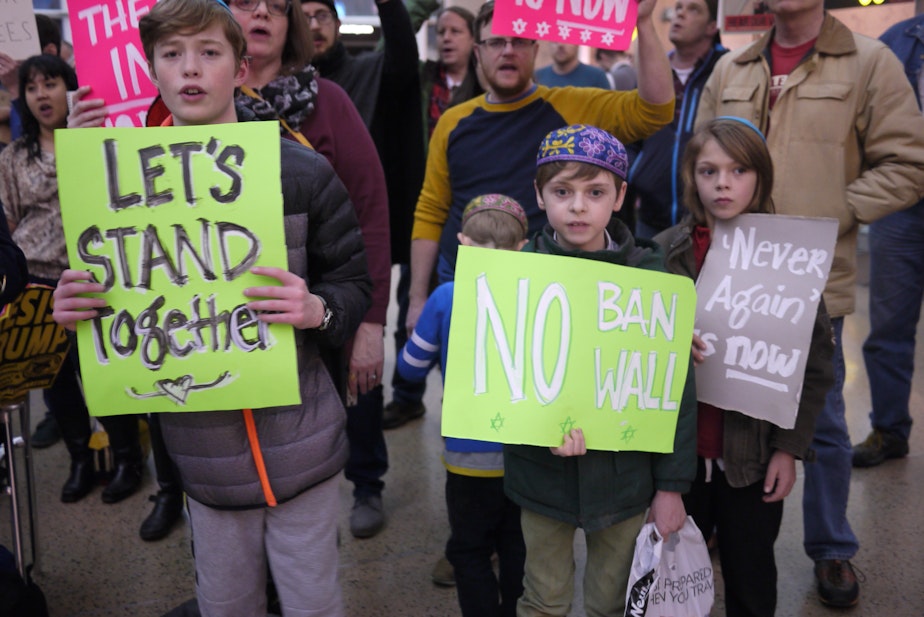What was the cost to people caught in the travel ban?

Airports were in chaos in January, hours after President Trump issued an executive order barring people from seven Muslim countries.
The incident prompted KUOW listener Pam Jensen to send this question to Local Wonder: “What was the cost to people who were caught up in the turmoil of the travel ban while en route to Seattle?”
For most travelers caught up in the confusion, the cost was rebooking flights. But several airlines were sympathetic. Some offered refunds, others waived the rebooking fees.
But for refugees, the cost of the travel ban comes in many forms.
Hiba Al-Hamadani, 32, told her story through an interpreter. About three years ago, Al-Hamadani fled to Turkey from her home in Iraq.
Sponsored
“Life is impossible in Iraq right now,” she explained. “As a divorced mom with two kids, it’s tough to live there—no job opportunity, no peace for the kids. I don’t feel safe for them to leave the house.”
Al-Hamadani and her two sons applied for refugee status to the U.S. It was granted two years later. The flight which cost $2,562 for the three family members, was scheduled for Feb. 9. “I was ready to travel so I sold everything — the furniture, the apartment that I canceled the lease.”
She was going to stay with a friend until their flight. But just days before, she got a phone call. “They said there will be no travel for four months. It’s up to you to go back or if you want to move your case to another country.”
Al-Hamadani said she was shocked and upset. The travel ban had just come down, which put her and her sons in limbo for another three years. Returning to Iraq, she said, was not an option. “The most stressful thing was about my kids because when I moved from Iraq to Turkey they were young kids,” said Al-Hamadani.
Now her oldest son is almost 16 years old. The younger one will be 11. They haven’t been to school since they fled Iraq. For Al-Hamadani, the travel ban has a different kind of cost: It thwarted their hopes for an education.
Sponsored
“With no education, no school,” she said, “what will happen, what future?”
Al-Hamadani wasn’t the only one in limbo.
Greg Hope, director of the Refugee Resettlement Program of the Episcopal Diocese of Olympia, points to a list of people who have been approved for refugee status. Hope said there were five other refugees like Al-Hamadani whose flights were delayed because of the first travel ban.
“As soon as the court order in Seattle came, they pretty much came,” recalled Hope.
The first travel ban has been replaced with a second one. That, too, is going through the legal process. There are 99 refugees on Hope’s list, waiting to be resettled while there is still a window.
Sponsored
Normally, their arrivals would be spaced out. But it’s been hectic, Hope said. For refugees, the alternative is a life with no prospects. “They’re in a camp or in a situation where there’s not a lot for them,” he said. “They’re not part of those societies and can’t go back to their homeland.”
Al Hamadani and her sons finally made it to Seattle two months ago. They live in Kent, and the kids are attending school. “I cannot forget my feelings when I took my kids to school the first day here,” she said. “My dream came true.”
A new life in America comes with new realities. Refugees like Al-Hamadani are responsible for their airfare coming here. But often they don’t have the means to pay for it up front. So they’re given an interest-free loan. Before the trip, they sign a promissory note that says within three months after their arrival, they’ll start paying it off.

